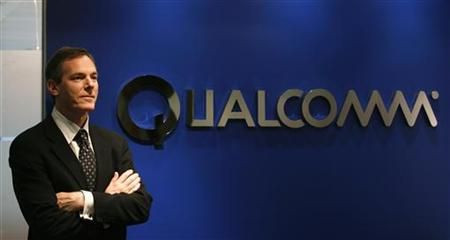CES 2012: Qualcomm’s Jacobs Sets Stage for Next-Generation War vs. Intel with Snapdragon Chips for Tablets, TVs

Qualcomm CEO Paul Jacobs said the company's Snapdragon wireless chip is already powering tablets and smart TVs, opening the way for the company to expand its reach beyond its dominance in mobile phones.
Noting that seven billion Snapdragon chip sets have already been shipped to leading manufacturers of mobile and smart phones, Jacobs told the International Consumer Electronics Show in Las Vegas new chips are already in all Windows Phones and will be in Windows tablets as they start to ship.
In effect, Jacobs, 48, laid down the gauntlet with Intel, the No. 1 chip maker, which is announcing the first chips with its Ivy Bridge 22-nanometer designs at the CES, with laptops already announced by Hewlett-Packard, Lenovo Group and Asus.
There are already 300 devices using Snapdragon and another 350 in development, Jacobs said in a CES keynote. All support Google's Android OS as well as Microsoft's Windows 8 OS, which CEO Steve Ballmer said Monday night would ship soon.
Qualcomm, the San Diego, Calif.-based chip powerhouse founded by Jacobs' father, Irwin, 78, plans to slot Snapdragon into new tablets later this year from Lenovo, Samsung Electronics, Motorola Mobility (soon to be part of Google), Dell, NEC and Asus, which are also Intel customers.
Unlike Intel, based in Santa Clara, Calif., Qualcomm doesn't manufacture any of its chips, licensing its designs to foundries worldwide, which keeps its capital costs lower. Paul Jacobs, 48, who succeeded his father as Chairman in 2005, intends to uphold that strategy.
In midday trading Tuesday, Qualcomm shares were up nearly 1 percent, to $55.93, giving the company a market capitalization of $94 billion, Intel shares rose 10 cents to $25.57, giving it a market value of $130 billion. Intel CEO Paul Otellini is scheduled to deliver a CES keynote Tuesday night, which is expected to formerly introduce and perhaps rename the Ivy Bridge chips.
Qualcomm's Jacobs, who holds a doctorate in electrical engineering from University of California, Berkeley, laid out a strategy to battle Intel across all emerging fronts. He showed a smart TV from Lenovo, built with a Snapdragon chip, which responds to voice commands for program selection.
He brought out Nokia CEO Stephen Elop, who said the Finnish smartphone maker's Lumia 710, 800 and 900 phones will all be on sale in the U.S. and Canada by February. All these phones run on Windows Phone OS.
As well, Jacobs said Qualcomm plans to challenge established players like Amazon.com and Barnes & Noble in the e-reader market. Last year, South Korea's Hanvon brought out a Snapdragon-enabled e-reader using an indoor-outdoor display system called Mirasol. Hanvon intends to ship a similar e-reader for the China market this year, he added.
Jacobs didn't say whether Qualcomm or Hanvon plan to enter the U.S. market for e-readers. Virtually all the e-reader shipped by Amazon, including the Kindle and Kindle Fires, are manufacturered by Taiwanese companies like Quanta Computing, which also have China operations.
Jacobs also said Qualcomm was using Snapdragon to move into mobile services such as microlending in Bangladesh. He brought up a video of Nobel Peace Prize winner Muhammad Yunus praising the company for phones that have helped his Grameen Bank.
Similarly, Jacobs said Snapdragon will be used for emerging medical electronics applications, including monitors that depict a user's cardiogram on the smartphone and other issues. He also announced the Qualcomm Foundation would help to underwrite a $10 million award from the X Prize Foundation for the best emerging medical technology product.
© Copyright IBTimes 2025. All rights reserved.






















